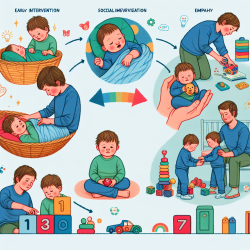Introduction
In the realm of speech-language pathology and child development, the integration of contemplative practices is gaining traction as a means to enhance well-being. A recent study titled Contemplative Practices Behavior Is Positively Associated with Well-Being in Three Global Multi-Regional Stanford WELL for Life Cohorts offers compelling evidence on the benefits of these practices. This blog explores how practitioners can leverage these findings to improve outcomes for children in educational settings.
Understanding Contemplative Practices
Contemplative practices encompass activities such as mindfulness meditation, self-compassion, and compassion for others. These practices aim to cultivate awareness, self-regulation, and a connection to something larger than oneself. The study highlights that engaging in multiple contemplative practices can significantly enhance various dimensions of well-being, surpassing the effects of physical activity in some cases.
Key Findings from the Study
- The study involved over 19,000 participants across three regions: California/San Francisco Bay Area, Hangzhou City, and New Taipei City.
- Statistically significant positive associations were found between contemplative practices and well-being across all regions.
- The impact of contemplative practices was comparable to or stronger than physical activity in enhancing well-being.
- Domains most influenced by contemplative practices included purpose and meaning, exploration and creativity, and spirituality and religiosity.
Implications for Practitioners
For practitioners working with children, incorporating contemplative practices into therapy sessions can be transformative. Here are some actionable steps:
- Integrate Mindfulness Activities: Incorporate short mindfulness exercises into daily routines to help children develop self-awareness and emotional regulation.
- Foster Self-Compassion: Encourage children to practice self-compassion, which can improve resilience and social connectedness.
- Promote Compassion for Others: Activities that encourage empathy and kindness can enhance interpersonal relationships and community well-being.
Encouraging Further Research
While the study provides robust evidence, further research is essential to tailor contemplative practices specifically for children. Practitioners are encouraged to explore how these practices can be adapted for different age groups and developmental stages.
Conclusion
Incorporating contemplative practices into therapy and educational settings offers a promising avenue for enhancing child development and well-being. By focusing on data-driven approaches, practitioners can create meaningful and lasting impacts on children's lives.
To read the original research paper, please follow this link: Contemplative Practices Behavior Is Positively Associated with Well-Being in Three Global Multi-Regional Stanford WELL for Life Cohorts.










